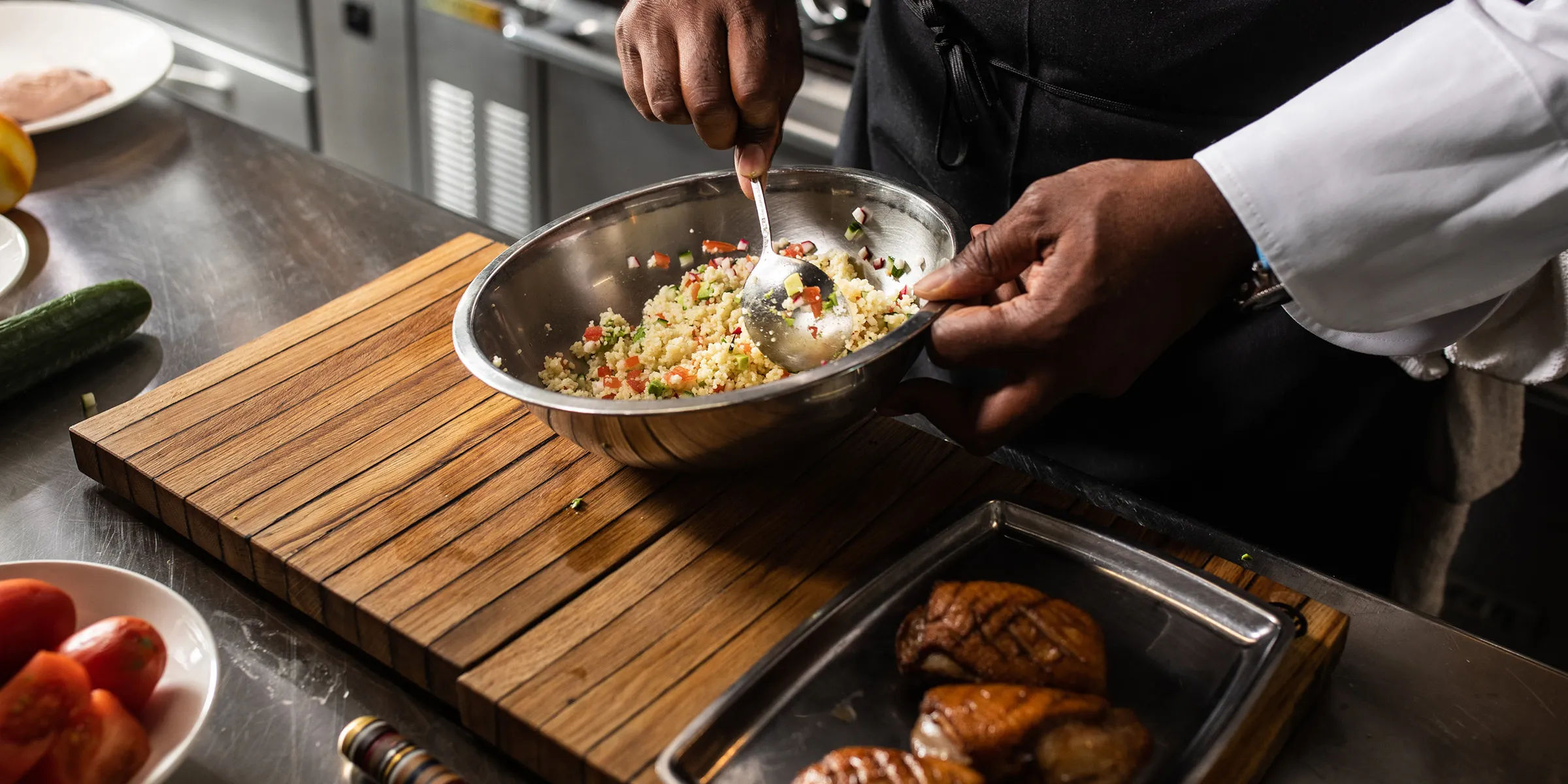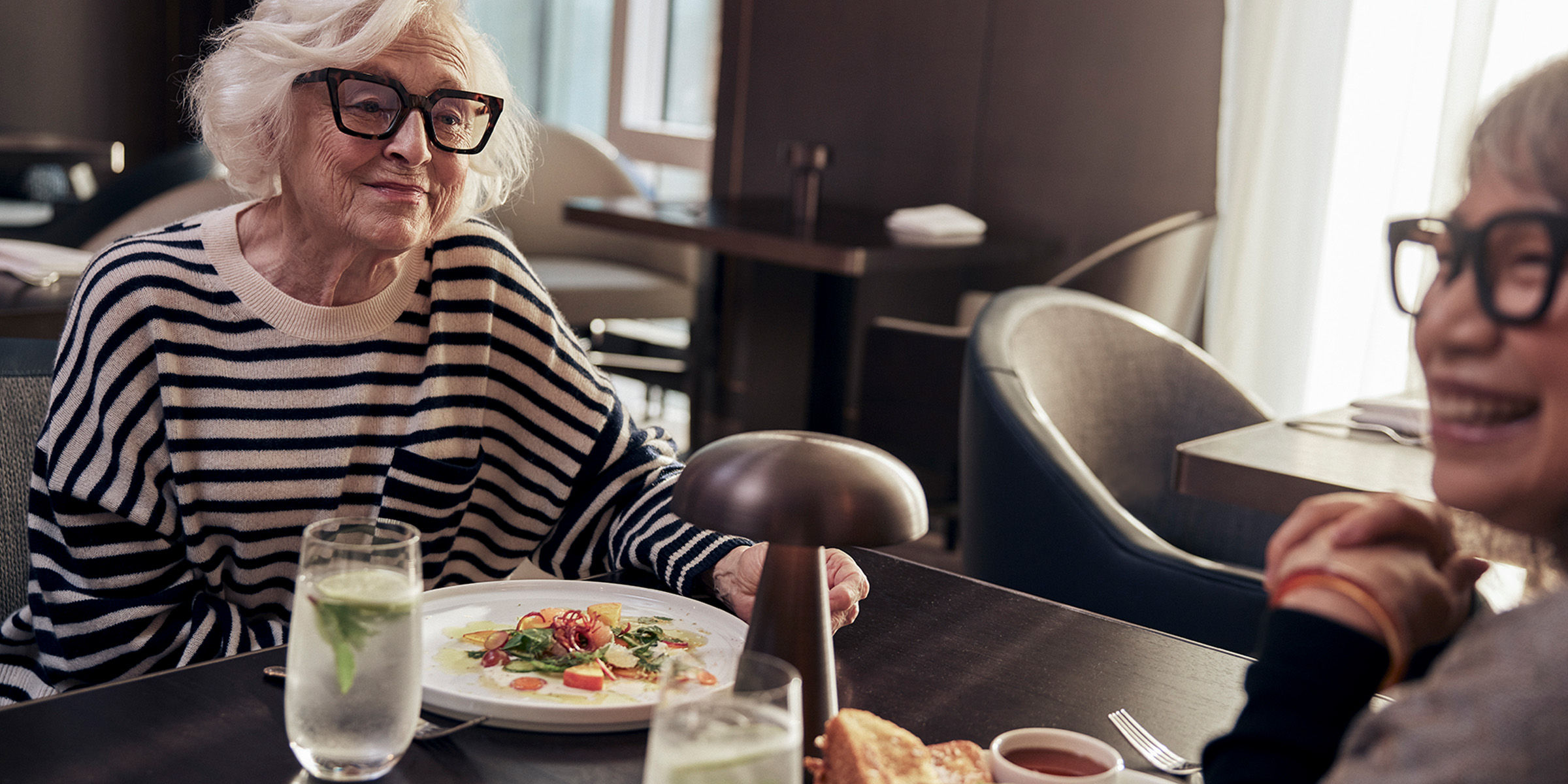JUNE 16, 2023
Better Food, Longer Life: How Luxury Senior Living Promotes Lifelong Vitality Through Nutrition
Share on Social Media

Food holds an essential place in our lives. It unites families, defines cultures, and brings people together in a shared experience.
While dietary preferences vary widely, luxury senior living and assisted living communities are revolutionizing the culinary experience for older adults, offering a remarkable range of food options that prioritize both indulgence and health.
Maintaining a healthy diet becomes increasingly challenging for many older adults for several reasons. These include:
- Medications: Older adults often find themselves taking multiple medications, which can interfere with nutrient absorption. Decreased appetite: As individuals age, their appetite naturally declines, leading to reduced food intake. This can result in inadequate consumption of essential nutrients.
- Diminished stomach acid: With age, the stomach's ability to produce sufficient stomach acid declines. This decrease in acid levels hampers the breakdown and absorption of vital nutrients like vitamin B12, iron, and calcium.
- Living alone: The solitary lifestyle poses its own set of obstacles when it comes to maintaining a nutrient-rich diet. From forgetting to eat to lacking the energy to shop for groceries, prepare meals, and clean up afterward, older individuals living alone face unique challenges in meeting their nutritional needs.
The Science and Art of Gourmet Nutrition
Luxury senior living communities understand the science behind good nutrition for older adults while recognizing the importance of making food desirable. By taking a high-end approach to cuisine, these communities ensure that nutrient-rich meals appeal to residents of discerning taste, enhancing their overall well-being and longevity.
The Better “Good Life”
It’s every luxury senior living community’s aspiration to provide residents the opportunity to lead their best lives. With culinary approaches that feature superb cuisine in magnificent venues, luxury senior living communities deliver proper nutrition and foster social connection among neighbors. Because food can be such a source of pleasure, sensory delight, and cultural pride, sharing a meal with neighbors can undoubtedly strengthen relationships.
For example, Coterie Luxury Senior Living, with locations in San Francisco and New York City, exemplifies this commitment to gourmet nutrition. Coterie’s chefs meticulously balance inviting cuisine with each resident’s unique nutritional needs. From luxe restaurant experiences to room service, outdoor venues, and private dining, Coterie offers an array of attractive options. Additionally, residents can indulge in fresh-baked goods, cocktail lounges, and wine bars, complemented by a pantry stocking service tailored to their preferences.
One Coterie resident leads an active lifestyle and enjoys a variety of healthy snacks throughout the day. She also likes to entertain guests at her home for pre-dinner cocktails and hors d’oeuvres. Therefore, the concierge will shop for her ideal selections of food and drink at a local specialty grocer twice a week. There, he chooses fresh produce, plant-based milks, cold-pressed juices, organic fruits and berries, and specialty probiotics to support the resident’s well-being. When returning from her daily power walk or yoga session, the resident is delighted to find her kitchen freshly stocked.
Partners for Life
Coterie’s dining program is overseen by Chef Chad Welch, who not only is specially trained in nutrition for older adults, but also builds his fine dining menus in collaboration with Mayo Clinic.
Chef Chad creates each recipe with taste, texture, heat, acidity, and mouthfeel all top of mind. He’ll then send it to Mayo Clinic Wellness Executive Chef Jennifer Welper, who will take the nutritional value a step further by recommending certain substitutions. One example is the swapping of sunflower seeds for pumpkin seeds, due to their anti-inflammatory properties.
In addition to nutrition, Coterie’s wellness team is trained and certified through the Mayo Clinic’s Healthy Living Program to offer personalized fitness plans, and stress and resiliency coaching. Each resident’s plan is tailored to their personal needs and physical abilities. Residents can confidently meet their fitness goals by joining a group exercise class or optimizing their use of the stylish, private fitness center.
These services and amenities make perfect complements to Coterie’s tailored cuisine.

Eating with Purpose
Older adults can have a range of age-related health issues, and luxury senior living chefs like Chad are well-versed in the ingredients that most effectively promote wellness. This includes heart health and brain health.
Heart health
According to WebMD, “A basic heart-healthy diet can help you control your weight. This is important because more than a third of people 65 and older are obese. That can lead to diabetes, some cancers, and heart disease.”
The foods recommended for a heart-healthy diet:
- Whole grains
- Low-fat dairy products like yogurt and cheese
- Skinless poultry
- Lots of fish
- Nuts and beans
- Non-tropical vegetable oils (olive, corn, and safflower oils)
Dietitians recommend two servings per week of fish high in omega-3, which lowers your chance of heart disease and may even help lower blood pressure.
One of Chef Chad’s favorite heart-healthy creations is a delectable quinoa salad, featuring edamame, kale, arugula, oranges, carrots, and wontons. Residents can also add fresh chicken or shrimp for protein.
"People need to know the extent of our commitment to sourcing fresh, in-season ingredients." – Chef Chad Welch
Brain health
For brain health, Mayo Clinic recommends the MIND diet. MIND stands for Mediterranean-DASH Intervention for Neurodegenerative Delay, and there is mounting evidence that sticking to this diet can reduce in the risk of cognitive decline and dementia, including Alzheimer's disease.
Recommended foods that are often found in Mediterranean diets include:
- Leafy greens
- Berries
- Nuts, specifically ones that are high in omega-3
- Fish
- An additional vegetable
Mayo Clinic also recommends foods to avoid or limit, which include butter, cheese, red meat, and sweets.
For residents’ cognitive health, Chef Chad has created two dishes that leverage MIND diet superfoods. The savory entrée option is fresh chicken or lamb crusted with cocoa nibs and coffee and served with a blueberry gastrique, while the sweet snack is a refreshing combination of crushed ice, blueberries, chocolate nibs, and coffee.
"Our venues aren’t ‘restaurant-style’ or ‘restaurant-like.’ They are actual restaurants." – Chef Chad Welch
Mental Well-Being
If you’re looking for ways to live a long life, start with what you put on your plate. Indeed, your diet can help improve your “mood and outlook on life” according to Mayo Clinic. “The science of how food affects our mood is based on how serotonin changes our brain chemistry. Serotonin is a neurotransmitter that's important for many things, including sleep regulation, mood, and appetite. Ninety to 95 percent of our serotonin receptors are in the gut.”
Studies show high-quality diets correlate with diets rich in “feel-good” chemicals like serotonin and dopamine. These foods include ingredients like pineapple, salmon, eggs, and poultry among others. Foods to avoid include those with high levels of fat, sugar, salt, and processed ingredients.
There are other advantages senior living communities offer to promote their residents’ mental well-being, starting with a rich social life. Social interaction can help combat feelings of loneliness and depression, which can be common among older adults.

A Fulfilling Lifestyle
Engaging with others provides a sense of purpose, belonging, and emotional support, which leads to improved mental well-being. Socializing regularly can also help stimulate the brain and promote cognitive health by enhancing memory and problem-solving skills.
A rich and varied engagement calendar offers numerous opportunities to connect and find intellectual stimulation. At Coterie, residents can participate in exercise classes or pursue interests like painting, film appreciation, or volunteering – all of which can contribute to a fulfilled and meaningful life.
Of course, it never hurts to treat yourself, and at Coterie there are numerous ways to do so. People can take in a movie at the private cinema, relax at the salon, go for an invigorating swim in the heated pool, or head to the library for some quiet reading time.
With gourmet nutrition options, services, and amenities such as these, along with well-appointed residences and beautiful architecture, one can see how naturally easy it is to find greater happiness and better health in senior living.
It’s Never Too Late to Eat Well
Despite the challenges of changing eating habits, luxury senior living communities like Coterie demonstrate that it's never too late to start eating well. Take this bit of encouraging news from Johns Hopkins Medicine. “There's surprisingly not that much difference between an 18-year-old brain and a 100-year-old brain,” says Argye Hillis, MD, director of the cerebrovascular division. “People are never too old to adapt their diet to meet their nutritional needs.”
If one combines good nutrition with low-impact exercise, an active social life, and hobbies to keep them focused and active, they can significantly increase the likelihood of leading a longer, healthier life.
Luxury senior living communities like Coterie make it not only possible, but highly pleasurable, too.
Coterie operates a portfolio of luxury senior living communities spanning the East and West Coasts. Please note that the services, partnerships, and amenities mentioned in this article may vary by location.